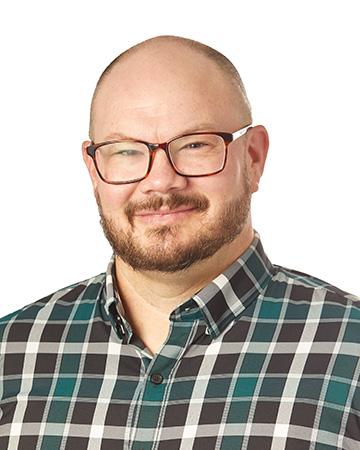Profile for Stewart Eskew

Contact me
Stewart Eskew
Pronouns: He/Him/His
Assistant Teaching Professor
Philosophy
University of Wisconsin-La Crosse
Stewart Eskew Pronouns: He/Him/His
Assistant Teaching Professor
Philosophy
Specialty area(s)
Ethical Theory, Medical Ethics, Ethics of A.I. Political Philosophy, Epistemology, and Philosophy of Science (emphasis in Philosophy of Biology)
Brief biography
Stewart grew up in California's Central Valley and completed his undergraduate degree in philosophy at California State University, Bakersfield. He attended graduate school at the University of Wisconsin, Madison where he completed both his Master's degree and his Ph.D. in philosophy. Stewart teaches a number of philosophy courses at UWL, including courses in ethical theory, medical ethics, social and political philosophy, epistemology, philosophy of science, and several introductory courses.
When he is not teaching, Stewart enjoys reading, traveling, camping, cycling and bicycle repair, and hiking. In general, Stewart enjoys spending as much time as possible outdoors.
Current courses at UWL
Fall 2025
PHL 101 - Introduction to Logic
PHL 303 - Ethics Theory and Metaethics
PHL 304 - Ethics of A.I.
Future Course Offerings
Spring 2026
PHL 101 - Introduction to Logic
PHL 334 - Philosophy of Science
PHL 339 - Medical Ethics
Education
Ph.D. in Philosophy from University of Wisconsin, Madison
Master of Arts in Philosophy from University of Wisconsin, Madison
Bachelor of Arts in Philosophy from California State University, Bakersfield
Career
Teaching history
Spring 2025
PHL 101 - Introduction to Logic
PHL/PSY 301 - Theory of Knowledge
PHL 339 - Medical Ethics
Fall 2024
PHL 101 - Introduction to Logic
PHL 304 - Ethics of A.I.
PHL 337 - Social and Political Philosophy
Spring 2024
FYS 100 - First Year Seminar: Fake News, Conspiracy Theories, and Other Bullsh*t
PHL 101 - Introduction to Logic
PHL 332 - Medical Ethics
Fall 2023
FYS 100 - First Year Seminar: Fake News, Conspiracy Theories, and Other Bullsh*t
PHL 101 - Introduction to Logic
PHL 334 - Philosophy of Science
Spring 2023
PHL 100 - Introduction to Philosophy
PHL 339 - Medical Ethics
Fall 2022
PHL 100 - Introduction to Philosophy
PHL/PSY 301 - Theory of Knowledge
PHL 303 - Ethics Theory and Metaethics
Spring 2022
PHL 100 - Introduction to Philosophy
PHL 337 - Social and Political Philosophy
PHL 339 - Medical Ethics
Fall 2021
PHL 100 - Introduction to Philosophy
PHL 101 - Introduction to Logic
PHL/PSY 301 - Theory of Knowledge
I have also taught a variety of philosophy courses for Marquette University, Coe College, University of Wisconsin - Madison, Madison Area Technical College, and The Badger Precollege Program (a University of Wisconsin - Madison outreach program for high school students).
Professional history
Professional Presentations
"How I'm Using A.I. Tools to Enhance My Teaching in the Humanities" UW - La Crosse A.I. Summit (2025)
"Moral Perception and the Phenomenal Character of Moral Experience" Wisconsin Philosophical Association (2025)
“Careers in Medical Ethics” UW-La Crosse CASSH Careers in Healthcare (2025)
"Is there anything to fear? The Ethical Dimensions of AI Technology” UW - La Crosse A.I. Summit (2024)
"Phenomenal Conservatism and Moral Perceptualism" American Philosophical Association Central Division Conference (2024)
“The Positive Case for Moral Perceptualism” Wisconsin Philosophical Association (2023)
“Careers in Medical Ethics” UW-La Crosse CASSH Careers in Healthcare (2023)
“Moral Supervenience and Moral Knowledge: How Not to Defend Moral Perception” Eastern APA (2013)
“Prospects for a Non-Causal, Non-Natural Moral Perceptualism” Alabama Philosophical Society Conference (2012); Iowa Philosophy Society Conference (2012)
"A Modest Defense of Moral Perceptualism" (2012)
“Religious Belief and Surrogate Medical Decision Making” Association for Practical and Professional Ethics (2008)
Research and publishing
Dissertation: A Modest Defense of Moral Perceptualism - University of Wisconsin, Madison (2022)
Eskew, Stewart & Meyers, Christopher (2009). Religious Belief and Surrogate Medical Decision Making. Journal of Clinical Ethics 20 (2):192.
Current Research Projects
“Perceptual Expertise, Moral Expertise, and Moral Perception”
This paper examines the relationship between perceptual expertise and moral expertise. I argue that moral perception should be conceived as a kind of practical, moral expertise.




